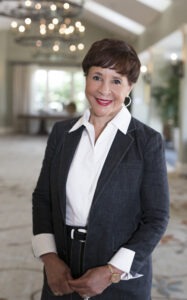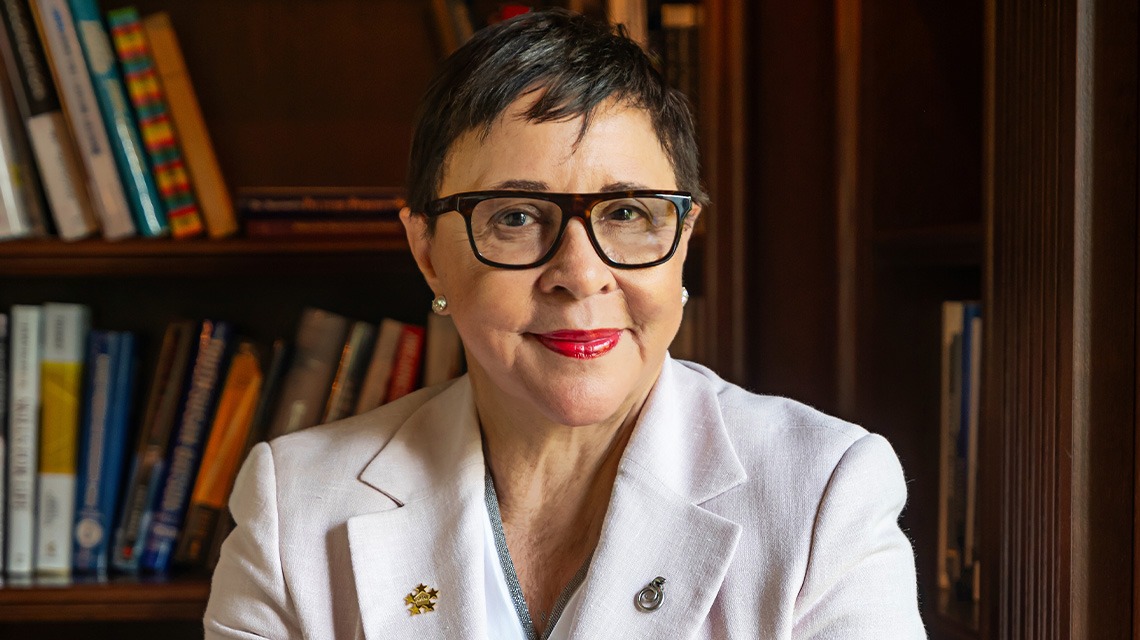The saying is that success is not dependent on the number of times you are knocked down, but the number of times you get back up. In the case of Sheila Johnson, no matter what life threw at her, she came back stronger and wiser. The professional violinist, entrepreneur, media executive (she co-founded the wildly successful Black Entertainment Network with her husband Robert Johnson), sports team owner (she had ownership in the NBA Washington Wizards, the NHL Washington Capitals, and the WNBA Washington Mystics) and philanthropist took all the wisdom learned from these diverse experiences to start the luxury brand Salamander Hotels & Resorts.
In her new tell-all book, “Walk Through Fire: A Memoir of Love, Loss and Triumph,” the 74-year-old trailblazer, hospitality founder and CEO shared the pain and the determination of her journey, explaining that the name of the hospitality company came from the historic name of the ranch in Virginia horse country she purchased as a refuge from the high-profile life and divorce she was living in Washington, D.C., After doing some research, she learned that in Greek mythology the salamander is the only creature that can walk through fire and come out the other end alive. She identified with that experience and adopted the name as a reminder of the power of resiliency.
Smart Meetings named Johnson a Smart Women in Meetings Hall of Fame Award winner in 2019 and after her book came out last year, she agreed to share the inspiration behind her journey and a chapter of the book that follows.
How Learning from Mistakes Led to Success on the “Double Bottom Line”
SM: Can you talk about the link between your classical music training and hospitality? Did the discipline and art of it help inform your approach to designing hotel spaces and caring for guests that is now part of Salamander?
SJ: My classical music training has served me well across a variety of businesses and endeavors. From an early age, it instilled in me a sense of discipline and application. But additionally, it helped my creative side flourish. Having a solid grounding in both sides of my brain really helped me as I was forming Salamander, especially from a design perspective. As an example, instead of lobbies, our hotels and resorts have living rooms because we want our guests to feel at home from the moment they walk through the door.
SM: How did your experience building BET and owning sports teams prepare you for the 24-7 demands of a hotel chain? What surprised you about hospitality after moving from those high-pressure arenas?
SJ: When I left university, I certainly did not envisage myself as the owner of a hotel company; however, I’m thrilled it worked out this way. I absolutely love the hospitality industry, and there are lots of similarities to both the sports and entertainment arenas. However, at the beginning, I was definitely surprised at how high-pressure the hospitality business itself can be—especially building and opening a property! But, I’ve grown with my company and now enjoy being an industry leader and voice.

SM: You have long been recognized as a global philanthropist in the areas of human rights, education and the arts. What are you most proud of and how does Salamander help you to be even more effective in those areas, including movie production?
SJ: Philanthropy is a central value of mine and I have certainly contributed to a wide variety of causes that are important to me. Forming a hotel company has given me a platform to create several events, including the Middleburg Film Festival. While we hold screenings throughout the town, our resort is the festival’s hub. It’s become so renowned that it’s been called an “Itty Bitty Cannes” by the Washington Post.
SM: You have overcome so much personally and professionally. Just when you were getting your feet under you, the economy and then Covid hit. How did you recover and how did that change your approach to business?
SJ: The pandemic was undoubtedly catastrophic on many levels. But, as we are a very nimble company, we were able to quickly adjust our business plan. We did close all of our properties but were able to re-open with new safety protocols in place earlier than most of our competitors. And, while we were closed, we took the opportunity to conduct some socially distanced deferred maintenance without impacting our guests. Business rebounded quickly and extremely strongly, and, for that, we are incredibly thankful.
Read More: Smart Chat: Michelle Roark, The Resilience of an Olympian
SM: You said you had to hit rock bottom to climb back out. Has that experience given you perspective that you might not otherwise have had? What does the self-talk in your head sound like when you come across an obstacle?
SJ: Challenges, mistakes and even if you feel like you failed at something—these experiences present opportunities for you to learn from, and then overcome them and emerge a stronger person. In the past 10 years, I’ve become more comfortable finding solutions to the questions I pose myself.
SM: It seems one of the things you have understood from the start is the importance of building strong teams. How did you learn this and how are you able to track down, hire and retain the right people?
SJ: This is simple: early in my hospitality career I hired the wrong people, so I learned this lesson quickly. Once you hire the right people in the top positions, which I have had in place for many years now, you enjoy the cascading benefit of hiring and retaining other top talent. I truly believe I have the finest team in the hospitality industry.
SM: Marin hosts a podcast called “What One Thing?” where she asks successful people to share their “secret sauce,” the one trait, habit or lesson that made all the difference and got them to where they are now. What would that be for you and how can our Smart Meetings community of hospitality and event professionals put that same power to work in their lives and careers?
SJ: Paying it forward makes a huge difference—for the recipient and the provider. It is our obligation as a society to continue to elevate the curious, intelligent, inspiring leaders of tomorrow. I also measure success in two ways: financially and socially. I call it the “double bottom line,” and I always strive to make sure all my companies and myself adhere to this philosophy.
“It is our obligation to elevate the curious, intelligent, inspiring leaders of tomorrow.”
– Sheila Johnson
Act Three: Peace and Happiness
Editor’s Note: Following is an excerpt from Sheila Johnson’s book “Walk Through Fire.”
As I write this, a decade has passed since that magical day when we cut the ribbon on Salamander Resort & Spa. I can hardly believe 10 years have already gone by, in what feels like the blink of an eye.
 The resort has become what I always hoped it would be, a place where everyone—Black, white, young, old, locals, and visitors from around the world—can come to relax, have a glass of wine, and spend time enjoying the surroundings. Salamander truly has become “Middleburg’s living room,” and the tax revenue and foot traffic we brought to the area have saved what was a dying town. Almost all the people who opposed the resort back in the early 2000s have come around, and many even apologized to me for having pushed so hard against it.
The resort has become what I always hoped it would be, a place where everyone—Black, white, young, old, locals, and visitors from around the world—can come to relax, have a glass of wine, and spend time enjoying the surroundings. Salamander truly has become “Middleburg’s living room,” and the tax revenue and foot traffic we brought to the area have saved what was a dying town. Almost all the people who opposed the resort back in the early 2000s have come around, and many even apologized to me for having pushed so hard against it.
The one exception is Robert Duvall, who, as he promised all those years ago, has never set foot in the resort. It’s a real shame, too, because I have no doubt he would enjoy it. And I would love to have him be an ambassador for the Middleburg Film Festival, now in its 11th year and a major stop on the film festival circuit.
Amid that final rush to get the resort open in 2013, we also somehow managed to pull together a first-class film festival. Under the guidance of executive director Susan Koch, we were able to book and screen a full slate of amazing movies, including “Nebraska”, “August”: “Osage County”, “Philomena”, and Lee Daniels’ “The Butler”. Showing The Butler felt especially sweet, not only because I was an executive producer on that film, but also because my husband, Bill, had a small part as a preacher.
Just as Robert Redford predicted, the Middleburg Film Festival has become a huge draw. We’ve had so many Oscar winners and Hollywood icons coming through, The Washington Post dubbed us the “itty-bitty Cannes.” Film lovers have rubbed shoulders at Salamander with Emma Stone, Kenneth Branagh, Damien Chazelle, Dakota Johnson, Brendan Fraser, Maggie Gyllenhaal and the list goes on and on.
We’ve also had composers such as Terence Blanchard, Diane Warren, Mark Isham, and Michael Abels, who’ve performed to rapturous crowds. Music and the arts are what saved me as a young woman, and I feel incredibly fortunate to have a place where I can share them with others.
While the Middleburg resort will always be nearest and dearest to my heart, we also spent the last decade branching out into other properties. We took on the Aurora Anguilla and Half Moon Jamaica in the Caribbean, as well as the elegant Hotel Bennett in Charleston. In 2021, the Aspen Institute selected us to take over the Aspen Meadows resort—and let me tell you, I cannot wait to bring some color to that place. Then, in 2022, two amazing events happened.
First, we took over the Mandarin Oriental hotel in Southwest Washington, DC. For the first time, “Chocolate City” has a Black-owned luxury hotel! What’s even better, the newly christened Salamander DC is located just blocks from that first house I bought in Southwest all those years ago. Everything comes full circle.
Not long after that, the Washington Business Journal announced that I was their “CEO of the Year.” After all those decades of trying to prove myself, of fighting to be heard and appreciated, I feel extremely gratified to finally be recognized as a successful businesswoman in my own right.
I think of my life as happening in three acts. In the first, I was a young woman struggling to find her place in the world. In the second, I was a wife, a mother, a teacher, and an entrepreneur…and still struggling. But in this, the third act, I’ve discovered my true self—and with that, I’ve finally found peace and happiness. If I learned anything, it was that I had to close the door on the toxic part of my life before my heart could open enough to accept the good things that awaited me. Unfortunately, I had to hit the very bottom before I could start to climb out of that miserable place.
This article appears in the January 2024 issue. You can subscribe to the magazine here.




